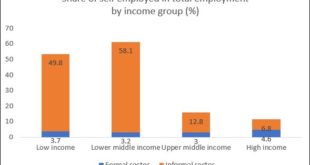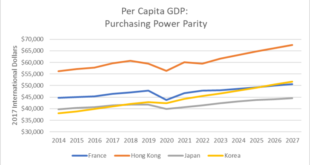The Covid-19 pandemic highlighted the urgent need for a universal social protection floor—something that has been talked about and even internationally accepted for more than a decade now, but has still received relatively little serious attention from policy makers in most countries. The challenge is to ensure basic levels of food, health, income and livelihood security, not only in periods of crisis like the pandemic or economic shocks but also in the “normal” course of economies and...
Read More »Contrary to what the NYT tells you, the problem in an aging society is distribution
from Dean Baker The New York Times had a major article reporting on how many people in South Korea, Hong Kong, and Japan are being forced to work well into their seventies because they lack sufficient income to retire. The piece presents this as a problem of aging societies, which will soon hit the United States and other rich countries with declining birth rates and limited immigration. While the plight of the older workers discussed in the article is a real problem, the cause is not the...
Read More »BLACK JEAN ELIOT DEAN #explore #indiemusic #nashville #selfcare
BLACK JEAN ELIOT DEAN #explore #indiemusic #nashville #selfcare
BLACK JEAN ELIOT DEAN #explore #indiemusic #nashville #selfcare
BLACKJEANELIOTDEAN #explore #nashville #newmusic #selfcare
BLACKJEANELIOTDEAN #explore #nashville #newmusic #selfcare
BLACKJEANELIOTDEAN #explore #nashville #newmusic #selfcare
My philosophy of economics
from Lars Syll A critique yours truly sometimes encounters is that as long as I cannot come up with some own alternative to the failing mainstream theory, I shouldn’t expect people to pay attention. This is however to misunderstand the role of philosophy and methodology of economics! As John Locke wrote in An Essay Concerning Human Understanding: The Commonwealth of Learning is not at this time without Master-Builders, whose mighty Designs, in advancing the Sciences, will leave lasting...
Read More »Fed will cause unnecessary harm to the US and world economy this year
from Mark Weisbrot Here are eight predictions for the coming year, in accordance with a hallowed tradition that I have previously not honored. If some of the supporting facts below seem unfamiliar, it could be because they have not received the attention they deserve. But they are real, and links to sources are provided. First, some good news about the US economy: Inflation will likely continue to fall until it becomes obvious that it is no longer a serious concern. Inflation (as measured...
Read More » Real-World Economics Review
Real-World Economics Review









